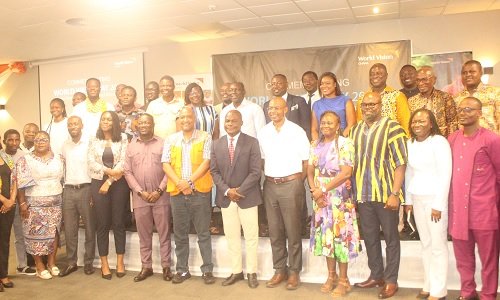News
Local Government Minister reveals government’s intention to revive the National Sanitation Day initiative

The Minister for Local Government, Chieftaincy and Religious Affairs Ahmed Ibrahim has revealed government’s intention to revive the National Sanitation Day initiative.
The day he said forms part of efforts to combat water pollution and ensure sustainable access to safe drinking water in Ghana.
Speaking at the 2025 World Water Day media engagement and panel discussion, organized by World Vision Ghana in partnership with other stakeholders in Accra on Tuesday, he highlighted the critical link between water and sanitation stressing the need for a collective approach to prevent the contamination of the country’s water bodies.
Mr Ahmed Ibrahim urged metropolitan, municipal, and district assemblies (MMDAs) to implement comprehensive and sustainable strategies to foster positive attitudes toward water, sanitation, and hygiene (WASH) in their communities.
He emphasized that without a change in behaviour, investments in WASH initiatives would not achieve their intended impact.
“One of the major barriers to sustainable water service delivery is the poor attitude of citizens. Therefore, I encourage MMDAs to develop and implement sustained behavioural change strategies,” Mr Ibrahim stated.
Mr Ibrahim also highlighted the importance of data in planning and executing WASH interventions effectively.
“MMDAs must be innovative in attracting additional resources and should also familiarise themselves with relevant sector policies and strategic documents,” he advised.
He assured that the ministry remained committed to ensuring the proper dissemination of these policies to enhance the capacity of MMDA staff.
“We are dedicated to working with all stakeholders to guarantee access to safe drinking water and improved sanitation for all, promoting both good health and socio-economic development,” he added.
The minister further stressed the importance of inter-ministerial coordination to harmonise data and find solutions to WASH service challenges.
He also called for a national conversation on corporate social responsibility (CSR) and its impact on corporate taxation.
“It is crucial to evaluate CSR initiatives to ensure they genuinely contribute to societal well-being,” he noted, adding that this would foster accountability among companies regarding their social and environmental impact.
The National Director of WVG, Jean-Claude Mukadi, reaffirmed the organisation’s commitment to collaborating with the government and stakeholders to address challenges in access to safe drinking water.
He urged the government to increase investment in WASH programmes to ensure universal access to clean water, especially for children.
“Through World Vision’s efforts, we have completed and commissioned 958 boreholes with hand pumps across various communities. Additionally, we have delivered 197 solar-powered mechanised water systems and provided 368 schools and 157 healthcare facilities with safe drinking water sources,” Mr. Mukadi stated.
Development Geographer at the University of Cape Coast, Professor Simon Mariwah, expressed concern over the declining investment trend in WASH
By Benedicta Gyimaah Folley
News
Prioritise affordable treatment of sickle cell treatment —Health Expert

Health experts have urged Ghana to prioritise affordable and accessible treatment for sickle cell disease (SCD) as advanced, but costly curative therapies remain out of reach.
SCD, an inherited blood disorder, affects about three in every 100 newborns in Ghana.
Globally, around 1,000 babies are born with the condition daily, with three-quarters in sub-Saharan Africa.
The disease causes severe complications including chronic pain, anaemia, infections, strokes and organ damage, often leading to shortened life expectancy.
In recent years, gene therapy has been developed as a potential cure.
However, its cost—running into millions of dollars per patient—makes it financially and technically inaccessible in Ghana.
According to Dr Lawrence Osei-Tutu, a Sickle Cell and Childhood Cancer Expert at the Komfo Anokye Teaching Hospital, “the country must instead focus on practical, lower-cost interventions such as hydroxyurea”, a decades-old cancer drug proven to reduce painful episodes, hospitalisation and life- threatening complications in SCD patients”.
Taken orally, the medicine improves red blood cell function and is considered safe and effective.
“Hydroxyurea therapy is as good as the cure and a low-hanging fruit to pluck, we must bring a cure to our sickle cell warriors, but do so sustainably.” he urged.
In a chat with The Spectator here, he said to create awareness on the disease, the expert noted that despite its benefits, “hydroxyurea is not widely accessible in Ghana.”
Stressing that, “many patients either cannot afford it or struggle with irregular supply through the health system.”
Moreover, he argued that scaling up access would provide immediate relief while the country builds the infrastructure, trains specialists and secures funding needed to support curative therapies in the future.
With an estimated 15,000 babies born with sickle cell disease annually in Ghana, Dr Osei Tutu cautioned that “failure to improve access to effective treatment will leave many patients vulnerable to preventable complications and early death.”
From Kingsley E. Hope, Kumasi
Join our WhatsApp Channel now!
https://whatsapp.com/channel/0029VbBElzjInlqHhl1aTU27
Hot!
Let’s reintroduce Cultural Studies to complement educational reforms — Tourism Minister

Madam Abla Dzifa Gomashie, the Minister of Tourism, Culture and Creative Arts, has emphasised the importance of reintroducing Cultural Studies in schools as part of Ghana’s broader educational reform agenda.
She said Cultural Studies would complement existing efforts to reposition Science, Technology, Engineering and Mathematics (STEM) and Technical Vocational Education and Training (TVET) to promote digital literacy and expand Creative Arts education.
Speaking at the 2025 Homowo Festival of the people of Ningo-Prampram, held on the theme: “Education: The Best Legacy for our Children,” Madam Gomashie said cultural education was critical to national identity and development.
She noted that the festival’s theme aligned with the Government’s vision to transform education in Ghana and encouraged the youth to embrace it not only as a means of personal development but also as a way of preserving traditional values.
These values, including patience, wisdom, and hard work, were at the core of the Homowo celebration, the Minister said.
“Cultural festivals like Homowo are vital instruments for strengthening cultural identity, preserving historical memory, and fostering national unity. Additionally, festivals serve as platforms for educating the youth through storytelling, music, dance, and other traditional practices, while also providing opportunities for community engagement.”
Madam Gomashie highlighted the strong foundation that Ghana’s tourism was built on, which included culture, traditions, and the creative industry, collectively contributing to over GH¢4.8 billion to the economy.
“Festivals give tourists reasons to visit our country. Therefore, with the right infrastructure and the development of all the domains, the sector can do more than what has been recorded,” she added.
Mr Sam Nartey George, the Member of Parliament for Ningo-Prampram and Minister of Communication, Digital Technology and Innovation, commended the community for their vibrant participation in the festival. He announced plans for the construction of a new nursing training school in Ningo, aimed at expanding access to healthcare education in the area.
Nene Osroagbo Djangmah XII, Paramount Chief of Great Ningo Traditional Area; King Dr Tackie Teiko Tsuru II, Ga Mantse; Nene Tetteh Wakah III, Paramount Chief of the Prampram Traditional Area; Prof. Odaifio Welentsi III, Paramount Chief of the Nungua Traditional Area; Naana Dugbakuwor Dugba II, Paramount Queen Mother of Great Ningo; and Mr. Elvis Afriyie Ankrah, Special Envoy on Religion and Inter-Faith Affairs, who represented the Chief of Staff, were among dignitaries at the festival. -GNA














